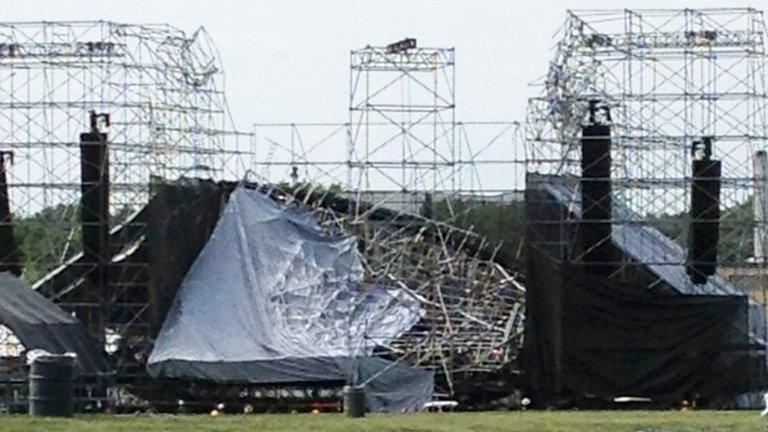'Pain and grief': Coroner inquest into Radiohead stage collapse begins
- Published
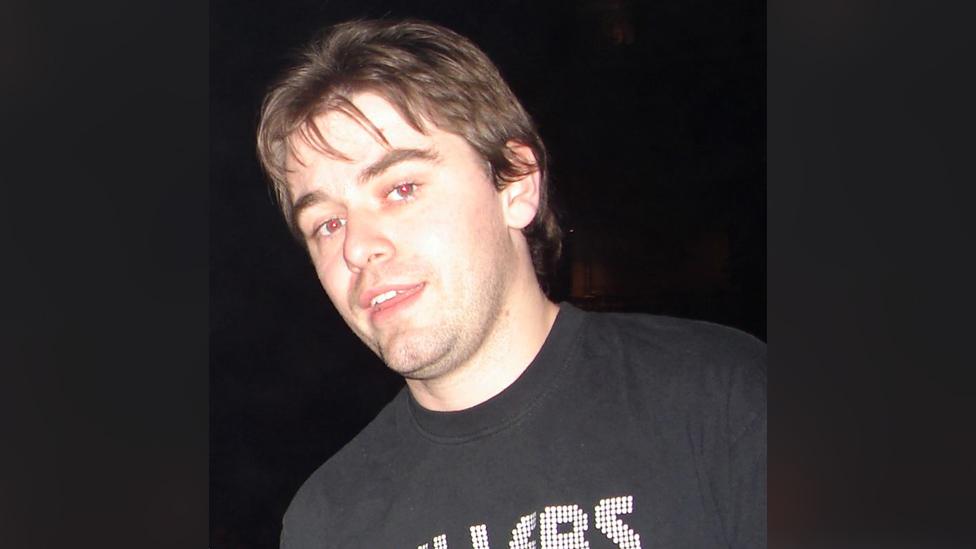
Scott Johnson
The stage collapse that killed a Radiohead drum technician caused lasting "immeasurable pain and grief" for the band, a Canadian coroner's inquest has heard.
Radiohead drummer Philip Selway told the inquest that the 2012 incident still haunts the band.
Scott Johnson died at Toronto's Downsview Park when the stage collapsed an hour before the gates opened.
An Ontario coroner is conducting an inquest into the deadly incident.
In testimony on Monday in Toronto, Mr Selway described the "anger and frustration" felt by the UK band, its crew members and Johnson's parents in the wake of the incident.
He said they have been left with a sense of a "complete failure of the justice system" in the case.
"The system has failed Scott, his family and other industry workers," he said.
Radiohead was set to perform a sold-out show in Toronto when the stage's metal scaffold roofing - tens of thousands of pounds of steel and equipment - collapsed onto crew members on stage at the time.
Johnson, a native of Doncaster, South Yorkshire, was killed and three other people were injured.
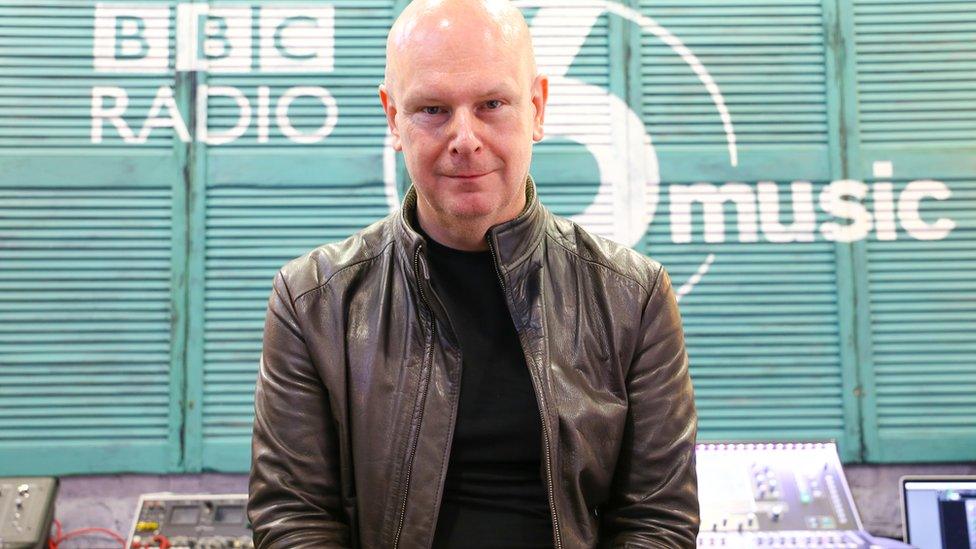
Radiohead drummer Philip Selway, seen here in 2017, testified about the impact of the stage collapse on the band and its employees
A year after the 16 June 2012 incident, police filed 13 charges under Ontario's health and safety laws against entertainment company Live Nation, engineer Domenic Cugliari and contractor Optex Staging and Service.
All three defendants had pleaded not guilty; but the trial was "stayed" in September 2017 - meaning no charges would be brought forward - because of a landmark 2016 Supreme Court of Canada ruling that said cases in provincial court should go to trial within 18 months.
While the case had ended up in court, the trial lasted more than 40 days spread over 14 months. Then the presiding judge, Shaun Nakatsuru, was appointed to a higher court, leading to a mistrial.
Radiohead band members and Johnson's family have been outspoken in demanding answers over his death.
They say because the case broke down there has never been a fulsome airing of what happened.
On the opening day of the inquest, Mr Selway described Johnson as a someone with a sense of fun and as a consummate professional "on top of his game" - someone who quickly became a member of the band's extended touring family.
The musician said the stage collapse had a profound impact on all those involved, including the 30 other crew members who were on or around the stage when the incident happened.
He described how band members "heard a very loud sound of breaking glass, which reached a crescendo", ran to the stage and saw it had collapsed.
"The collapse has made us vulnerable where we used to feel secure," he said.
The incident has left the band and its crew members on edge about the safety when on tour.
Radiohead - in an abundance of caution - has since adjusted how it designs its stage sets to mitigate potential risks, Mr Selway said.
They have also hired a tour engineer to ensure the stage safety is always double-checked when relying on third parties to provide staging.
Mr Selway said that he hoped the inquest would allow for a full understanding of how and why the collapse happened and would issue strong recommendations to prevent something similar from ever happening again.
The band only returned to Toronto to play in 2018, and held a minute of silence for Johnson during their concert.
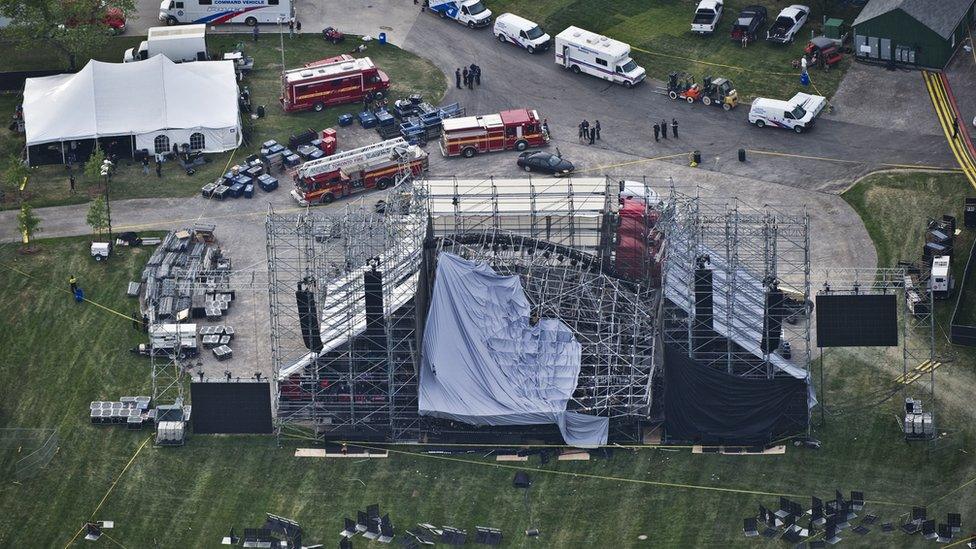
An aerial view shows a collapsed stage in Toronto's Downsview Park
The inquiry heard on Monday from Mr Selway, Ken Johnson - the father of the deceased drum technician - and others who had been on the scene when the outdoor temporary concert stage collapsed.
The inquest will examine the events surrounding Johnson's death and the jury may make recommendations aimed at preventing future deaths.
Mr Johnson, who himself works as a scaffolding safety inspector, told the BBC he is hopeful that the inquest will result in better safety measures in the future.
But he said he remains frustrated "with the injustice" in having his son's case closed due to trial delays.
- Published30 November 2017
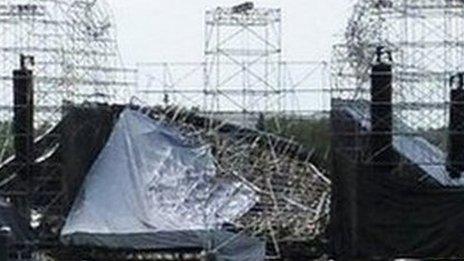
- Published17 June 2012
